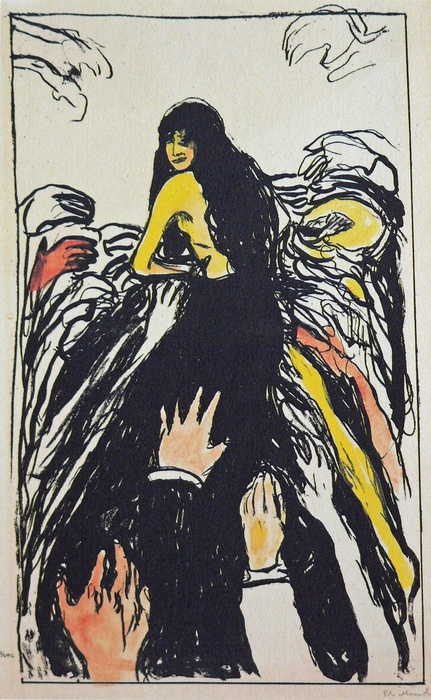Edvard Munch, Lust (1895) lithograph
(via)
S.G. Belknap’s essay in The Point takes a long look at the pick-up-artist cult encapsulated by Neil Strauss’s book The Game and contrasts it with Stendhal’s 19th century ruminations about love. Belknap wants us to see Stendhalian love as a structure of feeling that can protect men from the temptations of the pickup artists’ method, which is rooted in a post-scarcity attitude toward available sex partners (loosed in droves into public spaces by liberated modern mores) and a cold pragmatism about seduction as an elaborately staged performance:
Even if one is allured again and again by the very real possibility of all the perfume, slender waists and blowjobs one can shake a stick at — even then there is the creeping feeling that something isn’t quite right here, that something must be wrong, that something is missing. And what is missing is: love.
The pickup-artist gurus have apparently developed a highly rationalized and mechanistic seduction “technology” that has managed to secure a vaunted reputation for efficiency. It’s full of needless acronyms and reductive psychological claims that partly mask and partly glorify the fact that in practice, the method requires a zealous, monkish preparation and an Olympian indifference to the ordinary feelings of human association. Love is certainly beside the point, an ideological phantom that prevents weak men from pursing their Darwinian imperative to spread their seed.
Rather than establish a spontaneous, open-ended and reciprocal relation with another person, pickup artists want to assure that interpersonal exchanges follow a rigid script that culminates in sex, with the execution of the script becoming an end in itself, a disciplined mastery of procedures as procedures. They seek to rationalize the sexual encounter into an altogether predictable exchange befitting life under consumer capitalism, whose logic demands the steady conversion of the full panoply of human experience into on-demand products.
Pickup artistry seems a peculiar sort of service work in which a man suspends his ability to experience emotions in order to manufacture a synthetic affective experience for a woman. The reward is sexual activity as currency, as pure payment, safely insulated from any possibility of vulnerability or passionate surrender.
Belknap and probably the pickup-artist gurus themselves want to link this preoccupation with predictability and control with “manliness,” regarding manliness as the particular product that the elaborate PUA protocol produces for target women. Megan McArdle, responding to the piece, sees it instead as juvenile, narcissistic girliness. She wonders, “Who — over the age of 25 — believes that investing most of your time and energy in attracting another person means that you’re gaining power over them?” By becoming emotional engineers, designing a particular sort of immersive experience for the women who choose to play along with them, the pickup artists do seem to cede power rather than amass it, denying themselves the opportunity to be the subject of the narratives they create. Instead, they opt for an obsessional emotional risk-mangagement strategy, choosing to become the sad little men behind the curtain. Pickup artists can’t seem to outgrow the safety of the “game” for the delirious randomness of real life. They need to remain Dungeon Masters of a soft-pornographic role-playing adventure.
If Belknap is right about manliness being at stake, the pickup-artist routine structures it as a kind of servile butlerhood, as though being a man primarily means being an efficient concierge of false feeling. It also implies that manly men are enslaved to a rigidly quantitative view of experience, another particularly capitalistic compulsion. With another person, there can be no deep moments that stretch toward the infinite, no sense of simpatico that lifts you out of time, no communion. At the end of the day, there is only a number, the number of women you’ve taken for a ride.
